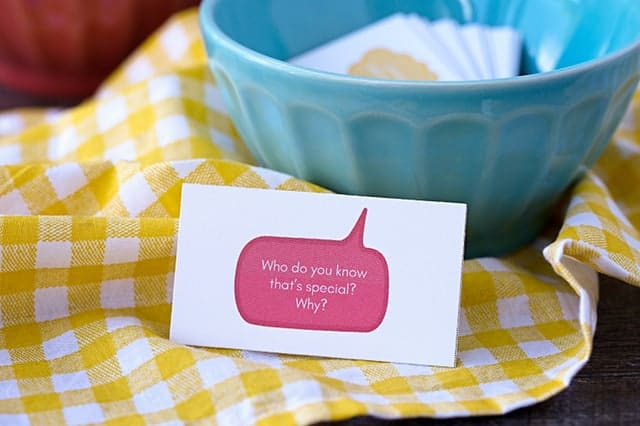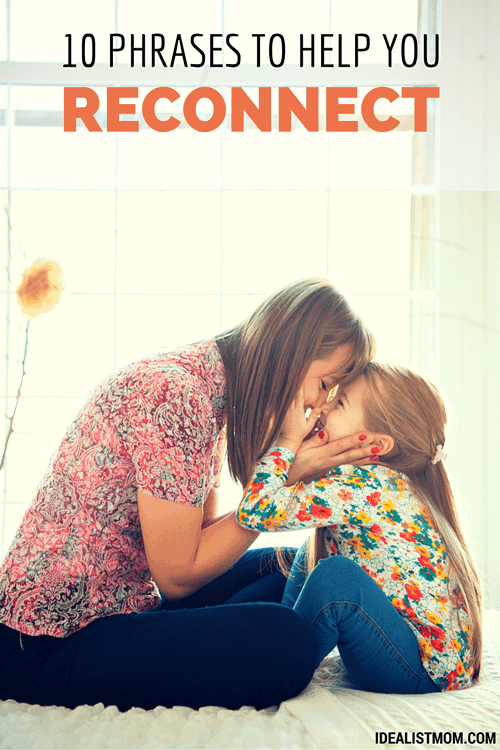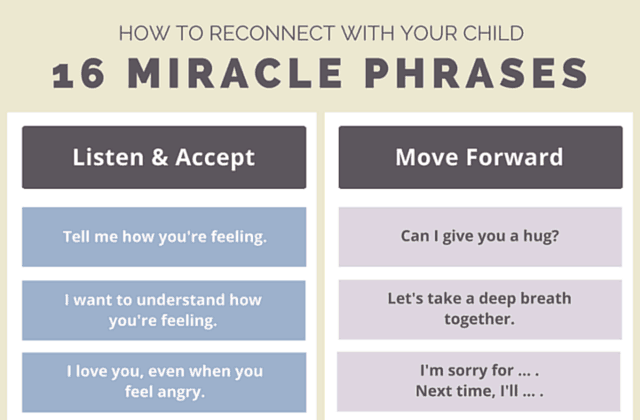10 Miracle Phrases to Help You Reconnect With Your Child
Some days, I feel like I can’t do anything right as a parent. The baby will only sleep on me, my toddler throws a temper tantrum every five minutes, and everything I say to my 8-year-old seems to push her further away.
I know baby sleeplessness won’t last forever and tantrums are a phase, but this disconnection with my oldest daughter is new territory for me as a parent.
After she and I have been snapping at each other all day, I want to camp out in my bedroom with a tub of Nutella, queue up New Girl, and wait for the storm to pass.
I haven’t gone that far yet, but I definitely have retreated into myself with the explanation of “she needs space.” And what happened is the opposite of what I hoped for. The disconnect just got worse.
I knew there had to be a better way, so I researched the best way to handle these tough moments. And this is what I discovered.
Bonus: As a bonus for joining my weekly newsletter, get this free cheat sheet of 16 miracle phrases that will help you reconnect with your child after a tough moment.
No Island You’d Want to Visit
When you find yourself in this situation, it can feel like your child is on an island with a dark, churning ocean separating you and her.
Take a step toward the island? Uh, no thanks. I’d rather keep my footing on solid land.
But your kid feels like she’s on an island, too. With every nagging comment or barked command that comes from your mouth, the tide rises.
Your kid lashes out, desperate to grab onto something. Anything to keep her afloat. And you pull away. You get quiet, or you leave the room.
I mean, of course you do. She’s being unreasonable and grumpy and disrespectful. You can’t let her treat you like that!
But here’s what you don’t see: Your child is standing in the middle of that horrible, horrible island, the choppy water lashing at her feet. Feeling like she’s the most alone that any person in the world has ever felt.
Stress hormones are flooding her brain. She can’t think clearly. She can’t see that by lashing out, she’s pushing you further away. Her brain isn’t capable of pulling back for the bird’s eye view of her rapidly sinking island.
Some adults can’t get perspective in the middle of a stressful situation, and they’ve had a lifetime of practice. And yet we expect our kids to be able to.

What Your Child Needs From You
She needs you to build a bridge.
She needs to know that you understand what she’s feeling, even if you don’t like it or agree with it.
She needs you to help her flush the nasty stress hormones out of her body because until that happens, she’s physically incapable of moving on.
Because here’s the uncomfortable truth of these troubling parenting days: You probably feel like you can’t do or say anything right – but your child feels exactly the same way.
And in those moments, your child needs nothing more and nothing less than your empathy.
Related: A Quick Fix for a Pouting Kid
But Here’s the Problem
In these moments, you have your own stress hormones to deal with, too. You feel frustrated, annoyed, or even flat-out angry. Even though you know you need to do something to reach out to your kid, your emotions cloud your ability to think clearly. When that happens, you are incapable of figuring out how to reconnect with your child.
Sometimes I’ve tried to deny that I feel frustrated or annoyed, but it never helps me deal with the situation. This is because bottling up a perfectly normal but negative emotion just makes it more intense.
Which is why I made the following list. Mainly, I made it for myself to use in those tough moments. But then I thought, Maybe I can share this with fellow parents?
Free Cheat Sheet: 16 Miracle Phrases to Help You Reconnect With Your Kid

How to Reconnect With Your Child: 10 Miracle Phrases
Below are 10 phrases you can use to jolt you and your child out of a negative downward spiral. I even made a handy printable with 6 bonus phrases, which you can download below to hang on your fridge and help you remember how to reconnect with your child in the heat of the moment.
You should know these aren’t just phrases that sound nice or that my grandma taught me to use. My suggestions are based on the science of how the brain works in those emotionally charged moments.
I compiled this list over a few months using several different sources, which I’ve noted or linked to below.
The next time you and your child aren’t getting along and you feel like you can’t say anything right, try one of these phrases.
But First, This Is a Must
Repairing your connection with your child after the tough moments is definitely important. But you can make those moments fewer and farther between by finding small, doable ways to connect every day.
To help us stay connected on an everyday basis – instead of just waiting for the negative moments to come – my family’s number one go-to solution is this set of the best family conversation starters. Unlike a lot of conversation starters for kids, these questions actually work to get more than one-word answers out of your kids.
We use these conversation starters at the dinner table, on the commute to and from school, and any other time we have a spare couple minutes. This one habit has been a game-changer for our family, helping us end every day feeling connected, loved, and happy.

Now…ready for the list?
1. Tell me how you’re feeling.
Getting your child to describe the emotion she’s feeling† – even if it’s just a word or two – takes the power away from the emotion by engaging the prefrontal cortex of the brain. And that’s a very good thing because it’s the prefrontal cortex that acts as the “grown-up” and keeps you from playing video games all day or reacting like a three-year-old to every minor disappointment.
2. I want to understand how you’re feeling.
Again, you’re getting your child to find words to describe how she’s feeling, and that will help her move on. But also, with this phrase you’re showing that you feel empathy for her and what she’s feeling. Empathy will build a bridge from where you are to the sinking island where your child feels stuck.
For this phrase and the previous phrase to work, be sure to look your child in the eyes and really listen to what she’s telling you.
3. I love you, even when you feel angry.
I’m sure you already know why this phrase works. Children need unconditional love from their parents in order to thrive physically and emotionally. This phrase shows your little one that even when you aren’t getting along, you still love her.
Change “angry” to whatever emotion your child is feeling.
4. It’s okay to feel mad.
If your child tries to suppress what she’s feeling, the feeling will probably intensify and come out in an even more unpleasant way. Feelings are a normal part of being human – even the not-so-fun ones. When you acknowledge it’s okay to have yucky feelings, you show your child you still love her even during those times.
Again, change “mad” to the emotion your child is experiencing.
5. Can I give you a hug?
In these moments, something in your child’s brain called the amygdala takes over. Why am I telling you about some random brain doohickey that neither one of us can pronounce? Because when you experience a negative emotion, the amygdala comes to life like an over-reactive car alarm. Then your brain shuts down to logic and interprets every little thing as a threat. This is why reasoning with your child when she’s upset doesn’t do any good at all.
Here’s the good news: Giving your child a hug will get the happy chemicals oxytocin and serotonin flowing. Even better than that, oxytocin reduces the reactivity of the amygdala. Just remember to make it a good one – turns out you need to hit this magic number of seconds for a proper hug.
Related: Why You’re Hugging All Wrong – And How to Fix It
6. Let’s take a deep breath together.
Deep breaths can stop a body’s stress response and lower the heart rate. And that’s something you and your child can definitely use during those strained times.
7. How can I help?
Asking this question gets your child thinking about solutions instead of focusing on the negative emotion. In order to think about solutions, your kiddo will need to engage her prefrontal cortex. And even if she can’t think of anything, the fact that you’re offering to help makes a big statement that you truly do care about how she’s feeling.
8. Can we start over?
This question works as a reset button. But first, a warning: The first few times you use it, it may not work. Here’s how to fix that.
Related: The Life-Changing Phrase You Must Use When Parenting Tweens
9. I’m sorry for…
You are human, after all. Show your child that a real adult owns up to her mistakes, and your little one will learn to do it, too. Maybe you didn’t acknowledge your child’s feelings at first. Or maybe you used a frustrated tone with her when you were actually upset about something that happened at work, or because you just realized you bounced a check, or because you haven’t slept more than three hours straight in three years.
For the record, this is not an effective apology: “I’m sorry I lost my temper, but you should know better.” Research shows a heartfelt apology helps repair a relationship, but no “buts” allowed.
10. Next time, I’ll…
For example, you might say, “I’m sorry I lost my temper, and next time I’ll try harder to stay calm.” A promise to change is an essential part of an apology.
Related: How to Go From Angry Mother to Happy Mom: With 5 Simple Hair Ties {Printable}
Get Your Free Cheat Sheet (With Bonus Phrases!)
When you’re in the thick of a negative interaction, it’s hard for your brain to settle on the right thing to say in order to reconnect with your child. Use this cheat sheet to help you in those tough moments. You’ll find these 10 phrases plus 6 more.
- Get the free cheat sheet. You’ll get the printable, plus join my weekly newsletter! Just click here to get it and subscribe.
- Print. Any paper will do the trick, but card stock would be ideal.
- Tuck your cheat sheet somewhere handy like on your nightstand, in your purse, or in your top desk drawer.
Here’s a sneak peek of your printable cheat sheet:
Before you go, get my FREE cheat sheet: 75 Positive Phrases Every Child Needs to Hear
Your Turn
Do you have a tip for how to reconnect with your child? Share in a comment below!




I LOVE this post, and will share it around. Good tips – one to stick on the fridge!
Love this article so so much and really resonates with my two highly emotional daughters. I really like that you included the physiological side of things and stress hormones…I think that really helps parents to ‘buy in’ to stepping back and being open to meeting the child’s needs first, which is not always an easy thing to do!
We’re all human and deserve kindness and grace to ourselves and others. But offering reconnection, not only helps the child in the moment, it also teaches them an important life skill about giving grace to others. Thank you for this useful printable tool!
It’s not only tweets we need help with. It’s teens and upward ….. my 18 yo son has anxiety issues as with severe eczema.. when we are in the throws of a “moment”, as I like to call them. I like him to know I am here for him.. I often say. ” I love you, please don’t ever feel your alone in this issue. We’re in it together. Your never alone. Love you mate!” I give him a hug and a kiss. He looks at me with sad eyes but he always knows he is loved..
Hi Kelly, what a beautiful post! You sound like an amazing mother. Thank you for taking all the trouble to find these answers, backed by science, and share them with us.
Thank you, thank you, thank you! Your simple comment about stress hormones flooding one’s brain in the heat of a difficult moment surely just changed a part of my life. I think so many times in life, we can’t confront a barrier simply because we lack the awareness that helps us see the barrier for what it is. And I can tell that having you bring to my attention the stress hormone phenomenon that we all feel…and loathe…and often feel desperate to instantly get relief from – just having you point it out will help me in those moments; when the flood happens in my own brain, it will be easier now for me to avoid doing what we all probably do too often – wrench ourselves from the negative, yucky stress hormone feeling by making a regrettable, hurtful action toward the person on the other end of the difficult conversation at hand. And when that flood may be happening inside the person I’m interacting with, I’ll have the awareness to do the kinds of things you wrote about to alleviate discomfort and pressure and potentially diffuse what otherwise might have become an explosion. Thank you again.
These phrases are great. I read intending to gain insight for future needs as well as maybe improve my relationship with my younger sister. I am also a primary grades teacher and was happy to find that I already use most of these phrases with my students! Great suggestions, my students usually respond positively to these prompts. My favorite is the apology from the adult to the child. They need to know everyone makes mistakes and is working on being better.
I loved your post – such valuable information and such a good reminder! Thank you very much! :)
thank you so much for sharing!
OMGoodness!! What an “AHA” moment I just experienced. Thank you for sharing and educating this “Gramgram”. You have provided me with answers to questions I didn’t even know to ask. Had I learned this 30 years ago I could have saved my daughter so much anguish and heartbreak. By your description, my amygdala has been stuck wide open all these years, having taken on a life of it’s own. I hope it’s not too late to build that bridge to her, even though I feel like I’m the one on the island. I now understand that I have the tools and the materials needed to start building. Thank you!!
In a world that is full of aggression, loving your child while you discipline is essential. We don’t have to be angry when we discipline to make it valid. We can calmly explain the why. Many times we expect our kids to know how to behave. We must explain to them each time. I often tell my kids, you didn’t know but now you do…so how can we handle this next time. It takes time and patience but it works!
I LOVE your approach, “I often tell my kids, you didn’t know but now you do…so how can we handle this next time.” Truthfully, as a first time and now divorced/single mother, this works both ways. I tell myself all the time, my son and I are both learning and we both need forgiveness and deserve grace during this challenging phase. Thankfully at the core of our mother/son relationship there is devotion and love beyond all else. However, in the midst of puberty and a world that has gone mad, we often have to remind ourselves of that!! Thanks for sharing!
Is there a cheat sheet to help reconnect a parent to adult children? Mine have cut me out of their lives with no warning or explanation. It’s been seven years now, my heart is broken beyond repair.
I am so sorry to hear. My oldest (22 years old) has pushed me aside because she is dating a jerk. I am trying to reconnect and would like to know how to do so.
I have reinstated, (upon reading this article) from a sense/state of despair
into a feeling of perpetual contentedness.
Thank you for these phrases! They’re what I need as my kids get older.
I also like a simple “Wow, that’s really frustrating!” or simply mirroring what my daughter told me (I know, you feel like you NEVER get to do x), even if it’s not an accurate statement. Just feeling heard helps all of us.
Thanks again!
Samantha
I have a question about email.I have subscribed but haven’t received any email yet?!
Hi Ljiljana! I double-checked, and the email system is showing your welcome email delivered and opened, so if you share an email inbox with someone else it’s possible they opened the email before you saw it. That will happen sometimes! Keep me posted if you’re still running into issues :-) Click here to contact me directly.
p.s. Updated to add: I see what might have happened! Your same email address was subscribed with “gmil.com” instead of “gmail.com” so your first welcome email bounced and couldn’t be delivered. It looks like you figured that out already and re-subscribed with the correct email, so you should be good to go!
Loved this and perfect timing after a gran passing
This is an excellent article for parents who may have been separated from children for several years military or any other life changing situations in which I have a 10 year old that I am re connecting with after 5 years. Her father and I are reconnecting at the same time. The advice works for us and I just have to say thank you.
Kelly, I think you just saved my life and my relationship with my kids…Your tips are simply genius and I feel I finally found what works for me after years of unsuccessful attempts at being a mom who does not explode every other day…I am forever thankful and grateful. God bless you!!
I loved reading your article! It hit home and left me with great ideas!! Thank you
I am very happy to be reading this. After working with children for many years in therapy and now retired I am spending lots of time with grandson. I am pretty patient but there are times that I need to rephrase/reset. His mom struggles immensely they have never had a typical child and she is always thinking he is going to misbehave before he has. She is of course exhausted from her work and with a teenage special needs son. It is difficult for me to give her advice, but I think this will help her.
A valuable article. I’m feeling a major disconnect with my son, and it pains me. I was immediately intrigued by the conversation starters, especially after reading it was a definite way to get more than one word responses. But you’re selling them? Conversation starters? Ridiculous.
I am scared to get back in my 2 boys 14 & 15 year old as I’ve not had contact for 3 years my mum died then my dad also covid arrived but this sounds like an excuse but true they only live 2 miles away I want to send a letter but don’t know what to say..lee